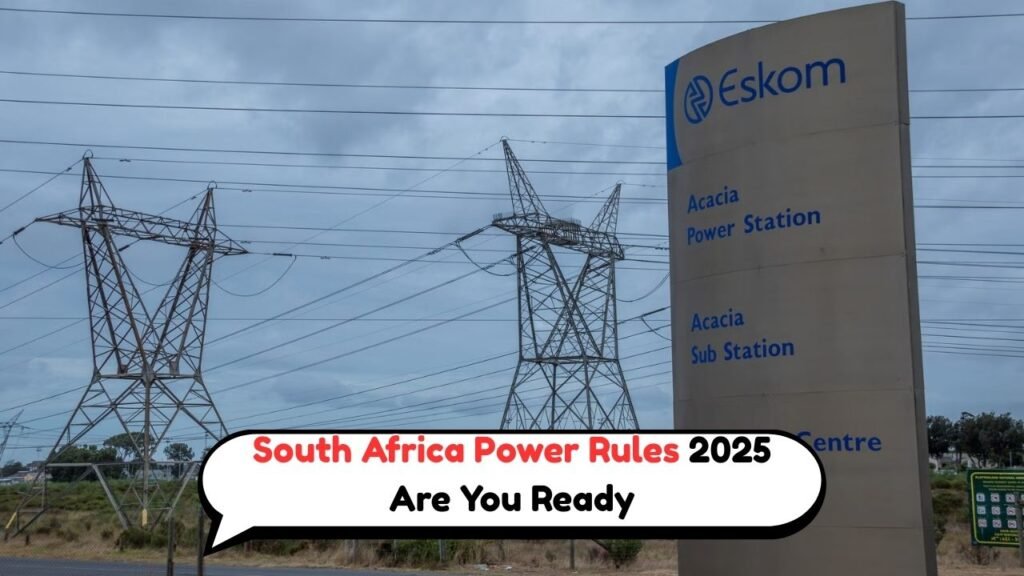2025 Electricity Regulations: In 2025, South Africa will see significant changes in its electricity regulations, impacting consumers across the nation. The new laws are part of the government’s plan to modernize the energy sector, improve efficiency, and ensure reliable power supply amidst growing demand. As these changes unfold, it becomes crucial for every South African to understand how these laws will affect their daily lives, from billing processes to the adoption of renewable energy solutions. With a focus on innovation and sustainability, the updated regulations aim to address current challenges in the energy sector while paving the way for a more resilient future.

Understanding the 2025 Electricity Regulations in South Africa
The upcoming 2025 electricity regulations mark a pivotal shift in South Africa’s approach to managing its power infrastructure. These changes are designed to enhance the country’s energy landscape by promoting sustainability and encouraging the integration of renewable energy sources. One of the primary objectives is to reduce the carbon footprint by transitioning away from coal-fired plants to cleaner alternatives like wind and solar. This transition is expected to create new opportunities for both consumers and businesses, as the demand for solar installations and energy-efficient appliances is likely to rise.
Another significant aspect of the new regulations is the emphasis on decentralizing power generation. By allowing more independent power producers (IPPs) to enter the market, the government aims to increase competition, which could lead to better service delivery and potentially lower electricity prices for consumers. Additionally, the introduction of smart metering systems will enable homeowners and businesses to monitor their energy consumption in real-time, thereby encouraging more efficient use of electricity.
The Impact of New Electricity Laws on South African Consumers
For South African consumers, the 2025 electricity laws bring a range of changes that will influence how they use and pay for electricity. One of the most anticipated changes is the shift towards time-of-use tariffs, which will vary electricity costs based on peak and off-peak hours. This system is designed to incentivize consumers to use electricity during off-peak times, ultimately helping to balance demand and reduce strain on the national grid.
Additionally, these laws will likely empower consumers to play a more active role in their energy consumption. With the expected increase in renewable energy options, homeowners may choose to install solar panels and battery storage systems, not only to reduce their reliance on the grid but also to potentially sell excess energy back to the network. This shift towards a more decentralized energy model aligns with global trends and offers consumers greater control over their energy sources and expenditures.
Renewable Energy: A Core Component of the 2025 Electricity Laws
Renewable energy is at the heart of the 2025 electricity laws, reflecting South Africa’s commitment to a greener energy future. The new regulations are set to provide incentives for both residential and commercial adoption of renewable technologies, such as solar and wind power. These incentives may include tax rebates and subsidies, making it more financially viable for consumers to invest in clean energy solutions.
Moreover, the laws aim to streamline the process for connecting renewable energy installations to the national grid. This simplification is expected to encourage more individuals and businesses to take the leap towards self-sufficiency in energy production. By fostering a robust market for renewables, South Africa not only aims to meet its environmental goals but also to bolster energy security and create jobs within the green economy sector.
Preparing for the Transition: What Consumers Should Do Now
As South Africa braces for the implementation of the 2025 electricity laws, consumers should begin preparing for the transition to ensure they benefit fully from the upcoming changes. One of the first steps is to educate oneself about the specifics of the new regulations and how they will impact individual usage and costs. Staying informed will allow consumers to make informed decisions about potential investments in renewable energy solutions.
Additionally, consumers should consider conducting an energy audit of their homes or businesses to identify areas where efficiency can be improved. By taking advantage of available incentives and upgrading to energy-efficient appliances, consumers can reduce their overall energy consumption and costs. Engaging with energy experts or consultants can also provide valuable insights and guidance on optimizing energy use under the new regulatory framework.




